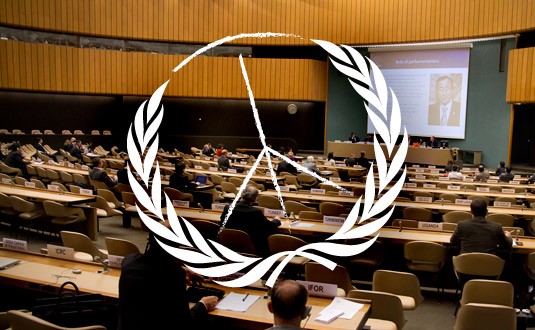Friday, 26th September marks the first ever Day for the Total Elimination of Nuclear Weapons as decreed by the United Nations General Assembly and events are being organised around the world by anti-nuclear networks such as UNFOLD ZERO and ICAN (the International Campaign Against Nuclear Weapons).
On Thursday 25th, there was a kick-off event at the UN in Geneva hosted by the permanent missions of Indonesia, Kazakhstan and New Zealand to publicise the day which it is hoped will enhance ‘public awareness and education about the threat posed to humanity by nuclear weapons and the necessity for their total elimination, in order to mobilize international efforts towards achieving the common goal of a nuclear-weapon-free world.’
Alyn Ware, Right Livelihood Laureate and co-founder of the UNFOLD ZERO campaign said, ‘There are over 16,000 nuclear weapons in the world. The use of any nuclear weapon by accident, miscalculation or intent would create catastrophic human, environmental and financial consequences. There should be zero nuclear weapons in the world.’
The date of the 26th September was chosen as it marked an important anniversary: the date on which the UN General Assembly held its first ever High Level Meeting on the subject of Nuclear Disarmament last year, 2013, and coincidentally it is also the date in 1983 on which a certain Stanislav Petrov, duty officer at a Soviet nuclear early-warning command centre, possibly saved the world from an accidental nuclear holocaust, the story of which has been immortalised in the film “The Man Who Saved the World”, starring such Hollywood luminaries as Kevin Costner, Matt Damon and Robert De Niro.
The Global Council of Abolition 2000, the global network of over 2000 organisations fighting for nuclear abolition, issued a statement commending the UN General Assembly for marking the date and “the United Nations as a whole for promoting this common goal for humanity and the planet.”
The statement noted darkly that, “Nearly 70 years later [since the first nuclear detonations over Japan], the prohibition of chemical weapons, biological weapons, landmines and cluster munitions has been achieved through international treaties. But the political commitment to prohibit and eliminate nuclear weapons is not yet manifest.”
As with all campaigns in the age of twitter and facebook, the aim of the anti-nuclear networks is to encourage as many global citizens as possible to express their support using social media.
UNFOLD ZERO are running a campaign asking people “How many nuclear weapons do you think are in the world?” and “How many should there be?” and getting them to film the results and post them online.
ICAN’s campaign consists of taking a selfie holding a sign that says: ‘I have #thecourageto ban nuclear weapons’ and then uploading it on Instagram using the hashtag #thecourageto or #goodbyenukes.
With both the USA and Russia spending the equivalent of hundreds of billions of US dollars on modernisation programmes for nuclear and conventional weapons, it seems more important than ever that such campaigns multiply and gain strength, catching the imagination of a global youth that has the creativity and imagination to deliver a message to world leaders right at the time they are meeting in New York at the latest UN General Assembly meeting which is overshadowed by the imminent war on ISIS in Syria and Iraq and the Ukraine crisis.










